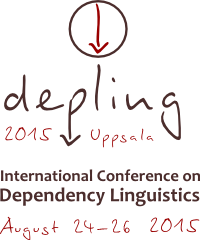


Call for Papers
The Depling conference responds to the growing need for a conference dedicated to dependency-based approaches in linguistics and natural language processing. In the past decade, dependencies, directed labeled graph structures representing hierarchical relations between morphemes, words or semantic units, have become very widespread in natural language processing. However, the linguistic significance of these structures often remains vague, and the need to discuss the theoretical and formal foundations of dependency-based concepts is felt strongly by many people working in these domains.
In general terms, the conference will investigate:
- The use of dependency structures in the description of linguistic phenomena, especially in a cross-linguistic perspective, in particular linguistic phenomena for which classical phrase structure models have proven to be unsatisfactory.
- The modeling of lexical phenomena and their role in dependency-based linguistic theories.
- The application of dependency-based approaches to natural language processing, including machine translation, parsing, generation, information extraction, etc.
Topics include but are not limited to:
- The use of dependency trees in syntactic analysis, parsing, generation, and corpus annotation of written and spoken texts.
- The use of semantic valency-based predicate and actancy graph structures and their link to classical logic.
- The elaboration of formal dictionaries for dependency-based syntax and semantics, including descriptions of collocations and paradigmatic relations.
- Links to morphology and linearization of dependency structures, using, for example, topological field theories.
- Dependency-like structures beyond the sentence, for example, to model discourse phenomena.
- The description and formalization of semantic and pragmatic phenomena related to information structure.
- History, epistemology, and psycholinguistic relevance of dependency grammar, including its relation to generative approaches to language.
Special Themes
Depling 2015 has two special themes:
- The dependency status of function words: The status of function words can vary significantly from one dependency model/scheme to the next and across the level of linguistic description within one and the same linguistic model (e.g., deep vs. surface syntax). Tesnière took many function words to be translatives, placed on the same level as the content word with which they form a (dissociated) nucleus. Frameworks such as Meaning-Text Theory and Word Grammar position most function words as heads over the related content words (in surface syntax). Some computational schemes like the Stanford Dependencies emphasize dependencies between content words and therefore subordinate function words to content words. Given these differences in how dependency models and schemes address function words, we think the status of function words is an area of dependency linguistics that deserves special attention.
- Dependency and translation: 2015 marks the 30-year anniversary of the death of Bernard Vauquois, one of the pioneers in the field of machine translation, the father of the famous Vauquois triangle, and one of the first proponents of the use of dependency-based representations in machine translation. Since the use of dependency structures is currently gaining ground also in statistical machine translation, it seems highly relevant to highlight the connections between dependency and translation.
Papers addressing one of the special themes will be submitted and reviewed in the same way as other papers, but will be accepted in a separate pool and presented in special sessions at the conference.
Requirements
Papers should describe original work; they should emphasize completed work rather than intended work, and should indicate clearly the state of completion of the reported results. Submissions will be judged on correctness, originality, technical strength, significance and relevance to the conference, and interest to the attendees.
Submissions presented at the conference should mostly contain new material that has not been presented at any other meeting with publicly available proceedings. Papers that are submitted in parallel to other conferences or workshops must indicate this on the title page. Papers containing significant overlap with previously published work should include this information in a separate text file (to be submitted alongside the paper on the EasyChair site).
Submissions
The deadline for the submissions is April 20, 2015. Papers must be submitted in PDF format through the Depling2015 EasyChair site.
Papers may consist of up to 10 pages of content (including references). All submissions should follow the two-column format and the style guidelines (see below). We strongly recommend the use of the LaTeX style files, OpenDocument or Microsoft Word templates created for the Depling 2015 conference (see below).
Reviewing of papers will be double-blind. Therefore, the paper must not include the authors' names and affiliations. Furthermore, self-references that reveal the author's identity, e.g., "We previously showed (Smith, 1991) ...", must be avoided. Instead, use citations such as "Smith (1991) previously showed ...". Papers that do not conform to these requirements will be rejected without review.
Style Files for DepLing 2015
In case of questions, please contact: depling2015@stp.lingfil.uu.se
